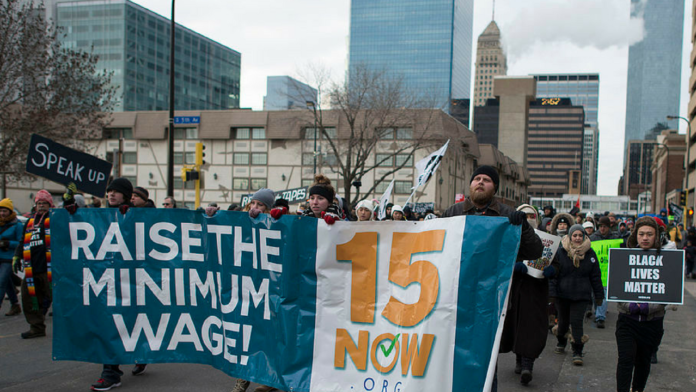MINNEAPOLIS- A public hearing for the establishment of a $15 minimum wage ordinance in Minneapolis was held at city hall on Thursday.
The ordinance discussed provides a $15 minimum wage will be fully implemented by 2022, with some notable exceptions. One such exception is a training wage, which could be beneath the minimum wage, may be implemented for those under 20 for a period of 90 days.
The debate has hinged less around the whether or not to implement a minimum wage, but rather how it should be implemented. Small business owners, especially restaurant owners, see the implementation of the $15 minimum as being incompatible with their business model. Specifically, this increase in wages, restaurant owners argue, will inevitably lead to an increase in the price of food at their establishments which will in turn decimate the tipping custom within the restaurant industry. To this end, some have proposed the idea of a tip-credit, which allow restaurant owners to make up the difference in pay if the employee does not receive a bottom line of $15 per hour with tips added in.
The supporters of the ordinance believe that some within the city are living below a ‘living wage’ currently. Those in favor of the ordinance supported this claim by citing the city’s own findings that 48 percent of people, or 150,000 people, in Minneapolis have reported being beneath a ‘living wage.’ Some of those who are supporting the $15 minimum wage do not support the ‘tip credit’ as they see tipping in general as an oppressive institution.
In an essay published in February, Minneapolis Mayor Betsy Hodges came out against a tip penalty, which would mean that the minimum wage would not apply for tipped workers. She also came out strongly against the institution of tipping, linking its origins to slavery. In the essay she stated that:
“It is not widely known that tipping as an institution is rooted in the history of slavery. The notion of tipping is not native to America, but was imported from Europe just as slaves were emancipated. At that time, restaurants and railroads insisted that the now-former slaves who were working in those industries were not worthy of earning a wage, and should subsist on the kindness of customers’ tips alone. In Europe where tipping began, it was a sign of gratitude for good service; but from the moment tipping came to America, it has been treated as a substitute for a decent, fair, and equitable wage.”
In an interview with CBS, one tipped worker, Sarah Webster stated, “Currently, we, as an average, make over $28 an hour, so if you don’t count our wages as tips then our wages drop to $15 dollar an hour.”
If Minneapolis were to institute a $15 minimum wage ordinance it would join cities such as San Francisco, Washington D.C., and Seattle.


















